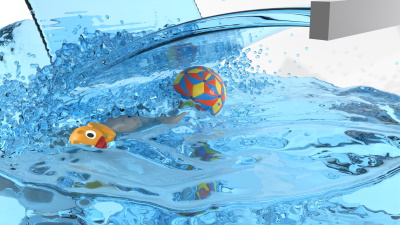Weighted Laplacian Smoothing for Surface Reconstruction of Particle-based Fluids
Vision, Modeling and Visualization

In physically-based animation, producing detailed and realistic surface reconstructions for rendering is an important part of a simulation pipeline for particle-based fluids. In this paper we propose a post-processing approach to obtain smooth surfaces from "blobby" marching cubes triangulations without visual volume loss or shrinkage of drops and splashes. In contrast to other state-of-the-art methods that often require changes to the entire reconstruction pipeline our approach is easy to implement and less computationally expensive.
The main component is Laplacian mesh smoothing with our proposed feature weights that dampen the smoothing in regions of the mesh with splashes and isolated particles without reducing effectiveness in regions that are supposed to be flat. In addition, we suggest a specialized decimation procedure to avoid artifacts due to low-quality triangle configurations generated by marching cubes and a normal smoothing pass to further increase quality when visualizing the mesh with physically-based rendering. For improved computational efficiency of the method, we outline the option of integrating computation of our weights into an existing reconstruction pipeline as most involved quantities are already known during reconstruction. Finally, we evaluate our post-processing implementation on high-resolution smoothed particle hydrodynamics (SPH) simulations.
@inproceedings {LBJB23,
booktitle = {Vision, Modeling, and Visualization},
title = {{Weighted Laplacian Smoothing for Surface Reconstruction of Particle-based Fluids}},
author = {Fabian L\"{o}schner and Timna B\"{o}ttcher and Stefan Rhys Jeske and Jan Bender},
year = {2023},
publisher = {The Eurographics Association},
ISBN = {978-3-03868-232-5},
DOI = {10.2312/vmv.20231245}
}

